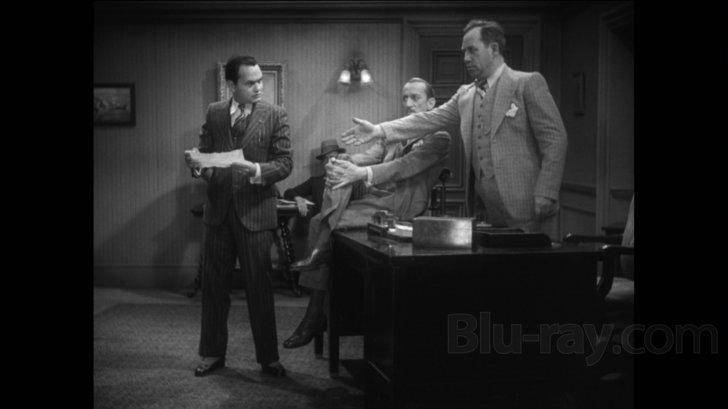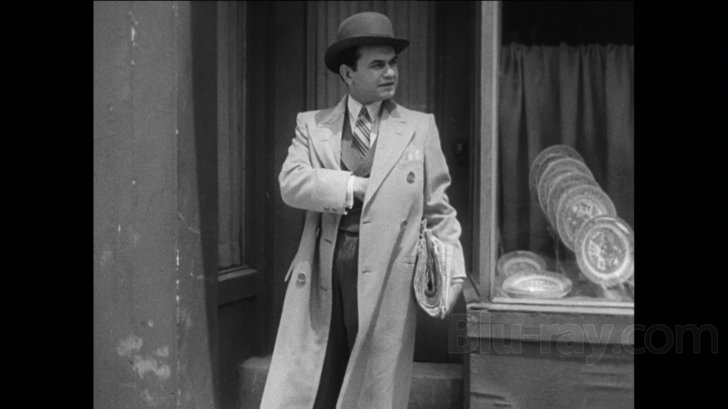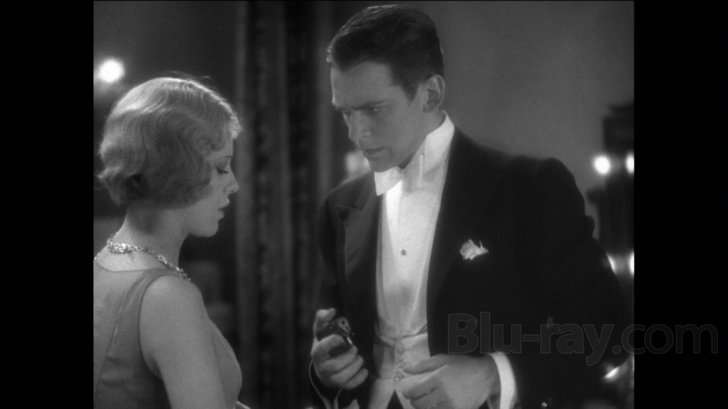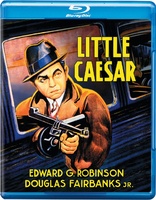Little Caesar Blu-ray Movie
HomeLittle Caesar Blu-ray Movie 
Warner Bros. | 1931 | 79 min | Not rated | May 21, 2013Movie rating
7.2 | / 10 |
Blu-ray rating
| Users | 3.0 | |
| Reviewer | 3.5 | |
| Overall | 3.0 |
Overview
Little Caesar (1931)
The ambitious criminal Rico moves from the country to the big city in the east and joins Sam Vettori's gang with his friend Joe Massara. Soon he becomes the leader of the gangsters, known as Little Caesar.
Starring: Edward G. Robinson, Douglas Fairbanks Jr., Glenda Farrell, William Collier, Jr., Sidney BlackmerDirector: Mervyn LeRoy
| Drama | Uncertain |
| Crime | Uncertain |
Specifications
Video
Video codec: MPEG-4 AVC
Video resolution: 1080p
Aspect ratio: 1.32:1
Original aspect ratio: 1.33:1
Audio
English: DTS-HD Master Audio Mono (48kHz, 24-bit)
Spanish: Dolby Digital Mono (Spain)
German: Dolby Digital Mono
Subtitles
English SDH, French, Portuguese, Spanish
Discs
25GB Blu-ray Disc
Single disc (1 BD)
Playback
Region free
Review
Rating summary
| Movie | 3.0 | |
| Video | 3.5 | |
| Audio | 4.0 | |
| Extras | 3.0 | |
| Overall | 3.5 |
Little Caesar Blu-ray Movie Review
It Wasn't the End of Rico
Reviewed by Michael Reuben May 14, 2013Note: "Little Caesar" is available either separately or as part of the Warner Ultimate Gangsters Collection: Classics. Edward G. Robinson had a long and fruitful acting career, creating an array of indelible portraits that included the insurance investigator Barton Keys in Double Indemnity, the wily gambler Lancy Howard in The Cincinnati Kid and the aging, nostalgic investigator Sol Roth in Soylent Green (his final role). But no character more defined Robinson than his early portrayal of Caesar Enrico Bandello, known on the streets first as "Rico" and eventually as "Little Caesar" in the 1931 film of the same name. Together with such early classics as The Public Enemy (1932) and the original Scarface (1932), Little Caesar drew the broad outlines of the gangster film that later masters like Francis Coppola and Martin Scorsese have since painted with ever more detail. Watch Little Caesar, and you can easily spot the progenitors of the famous shot in Goodfellas where Scorsese introduces the rogues gallery of gang members with his roving camera, or how Coppola stages a climactic execution on the courthouse steps in the first Godfather. Like the criminal organizations they depict, gangster films have a strong sense of tradition. That Robinson feared being typecast for Rico is a tribute to how well he did his job. Viewed objectively, Little Caesar is not a particularly good film. The plot is sketchy, much of the supporting cast is wooden, and there's none of that sense one gets from the best crime stories of how illegal enterprises operate and what allows them to flourish. If not for Robinson's boundless energy, his ability to radiate Rico's relentless drive to succeed as a kingpin, even from the edge of the frame, Little Caesar would have been forgotten. Instead, Rico became an icon, popping up routinely in Warner Brothers cartoons, where a mere sketch of Robinson's distinctively round features and a few drawn-out syllables were enough to evoke Rico's menace. Robinson's work in Little Caesar epitomized the advice of the unknown film director who is said to have advised his actors: "Get into the frame and do something interesting."

Little Caesar opens with one of only two actual crimes portrayed in the film, a stick-up that occurs in darkness and is told by director Mervyn Leroy almost entirely through the sound of gunshots. This was only four years after The Jazz Singer, and filmmakers were still exploring the possibilities of telling stories through the audio wonders of Vitaphone. Afterwards, we find Rico (Robinson) and Joe Massara (Douglas Fairbanks, Jr.) sitting together in a diner, where Rico is complaining about their small-time lot. The big city is where the action is, says Rico, scanning a newspaper headline about a successful gangster, "Diamond" Pete Montana. Soon enough, the pair are headed for the city, presumably Chicago, where Rico talks his way into a position with the gang of Sam Vettori (Stanley Fields), to whom Rico vouches for Joe as well. But Joe has other plans. He wants a less dangerous life as an entertainer and takes a job dancing at the Bronze Peacock, a nightclub owned by Vettori's rival, "Little Arnie" Storch (Maurice Black). Sam's platinum-haired dance partner, Olga (Glenda Farrell), doesn't know about his criminal life, but she guesses at it when she feels a gun under his shoulder. She falls in love with him anyway. Joe's agonized loyalties are put to the test when Vettori decides to rob the Bronze Peacock on New Year's Eve. As an official member of Vettori's mob, Joe is required to participate; indeed, they need him as an inside man, and Rico insists that he play his part. The top boss of the city, known only as "the Big Boy" (Sidney Blackmer), has ordered everyone to avoid bloodshed, because an anti-crime crusader named McClure (Landers Stevens) has the rackets under intense scrutiny. But Rico can't restrain himself, and he shoots someone during the robbery. Unfazed, Rico accuses Vettori of going "soft" and seizes control of his gang. (A favorite Rico phrase is that someone can "dish it out" but "can't take it".) Eventually, Rico even drives Little Arnie out of town. Bowing to the inevitable—or maybe giving Rico enough rope to hang himself—the Big Boy puts Rico in charge of the entire North Side. Rico now has one major vulnerability, and it's his old friend Joe, who has never recovered from the trauma of assisting Rico on the New Year's Eve heist at the club that employs him. But when Rico tries to treat Joe with the same cold-hearted toughness that won him the title of "Little Caesar", he finds, to his shock, that it's not so easy. Much debate has been waged over the reason for this one chink in Rico's armor. Is it repressed homosexuality? (I doubt it.) A weakness for the only friend he ever had? (Much more likely.) A sudden glimpse of himself through Joe's eyes? (Possibly.) It's hard to say for sure, because the script and Leroy's spare direction provide no backstory for Rico and no sense of what motivates him. We only know that, at a key moment, he flinches. Then he falls as fast as he rose.
Little Caesar Blu-ray Movie, Video Quality 

The major issues with Warner's 1080p, AVC-encoded Blu-ray of Little Caesar are inseparable from the source material, which, despite efforts at clean-up, still suffers from obvious damage. A significant number of vertical scratches last anywhere from a few seconds to half a minute. None of them renders any of the image unwatchable, but they are quite noticeable. Frames are missing in several spots, causing obvious jumps. Fortunately, none of these breaks occur at key moments in the drama. For the rest, Warner has provided a nicely film-like transfer, with natural-looking grain, deep blacks, well-balanced contrast allowing proper delineation of shades of gray, and reasonably good detail for a film of this vintage. The quality of the image varies from somewhat soft to astonishingly sharp (e.g., in a sequence of a funeral procession). I was not at all surprised to see the average bitrate come in at 29.34 Mbps. With the film in black-and-white and substantial screen space devoted to the black "windowbox" bars, major compression should not be an issue with this 79-minute film. Barring the discovery of superior elements, or a laborious frame-by-frame repair of the damaged sections, Little Caesar is unlikely to look better.
Little Caesar Blu-ray Movie, Audio Quality 

The film's mono soundtrack is encoded as lossless DTS-HD MA 1.0, and it's a pleasure to hear Robinson's distinctive speech patterns as Rico at such high fidelity. The clarity doesn't do all that much of the rest of the dialogue a favor, though, because many of the remaining performances are quite weak. However, Thomas E. Jackson's turn as the sarcastic Lt. Flaherty—the second best performance in the film—comes through better than I've ever heard it before. The various pistols and machine guns don't have anything like the punch of today's movie weaponry, but they make enough of a statement for a gangster film of this era. The sparely used underscoring has been attributed to composer David Mendoza, who is uncredited.
Little Caesar Blu-ray Movie, Special Features and Extras 

The extras have been ported over from Warner's 2004 DVD.
- Commentary with Richard B. Jewell: A film historian at the University of Southern California, Jewell narrates, explicates and provides historical context as the film unspools on the screen. It's an OK commentary, but there's nothing here that can't easily be learned elsewhere.
- Warner Night at the Movies 1930
- Introduction by Leonard Maltin (480i; 1.33:1; 4:07): The well-known critic and film historian provides an introduction to the various 1930 items listed below.
- "Five Star Final" Theatrical Trailer (480i; 1.33:1; 1:56): Another film featuring Robinson, released the same year as Little Caesar.
- Newsreel (480i; 1.33:1; 1:47): In this excerpt from Hearst Monotone News, the girlfriend of slain gangster Legs Diamond gives an interview.
- Short: "The Hard Guy" (480i; 1.33:1; 6:28): A story of the Depression set in Hell's Kitchen, starring a youthful Spencer Tracy.
- Cartoon: "Lady Play Your Mandolin" (480i; 1.33:1; 7:17): The animators had joined Warner from Disney. If anyone today released a cartoon with such overt similarities to Disney properties, they'd receive a cease-and-desist order before the conclusion of the first preview.
- Featurette: Little Caesar: End of Rico, Beginning of the Antihero (480i; 1.33:1; 17:09): An entertaining overview of the place of Little Caesar in the history of both film and the gangster genre, told primarily through interviews with various film scholars, as well as (briefly) director Martin Scorsese.
- 1954 Rerelease Foreword (480i; 1.33:1; 0:45): A portentous text crawl that accompanied a theatrical re-release of Little Caesar and The Public Enemy, reminding us that we must all stand together in the fight against crime.
- Theatrical Trailer (480i; 1.33:1; 2:11): Robinson's clips make the trailer, as Robinson himself makes the film.
Little Caesar Blu-ray Movie, Overall Score and Recommendation 

Like Scarface, the novel of Little Caesar by W.R. Burnett was inspired by Al Capone's rapid ascent to the pinnacle of Chicago's criminal empire. Capone's ruthlessness, his penchant for flaunting his activities and his status as a semi-celebrity sparked the imagination of more than a few writers, actors and directors. But even if Capone was ultimately undone by his refusal to keep a low profile, he had a certain native shrewdness that one never sees in Robinson's Rico. Rico is the first in a long line of movie gangsters who are more id than intelligence. His successors include Sonny Corleone and Goodfellas' Tommy DeVito, who share Rico's intimidating temper and routinely use violence when lesser means would accomplish their goal more quietly. Such characters always end badly in gangster movies, either because at some point they're outmatched or because their own organization ultimately decides they are a liability. Despite some video issues, Little Caesar is recommended.
Similar titles
Similar titles you might also like

The Public Enemy
1931

The Petrified Forest
1936

Scarface 4K
1932

The Irishman
2019

Once Upon a Time in America
Extended Director's Cut
1984

Live by Night
2016

Billy Bathgate
1991

White Heat
1949

Performance 4K
uses original UK version soundtrack
1970

GoodFellas
1990

Casino 4K
1995

The Roaring Twenties
1939

Boardwalk Empire: The Complete Fifth Season
2014

City of God
Cidade de Deus
2002

A Prophet
Un prophète
2009

Capone
2020

Blonde Venus
1932

By the Gun
2014

Wonder Wheel
2017

King of New York
1990
